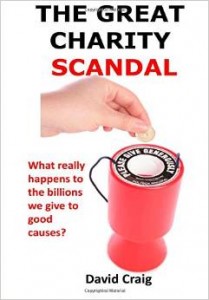Apparently lists are the ‘in thing’. One popular website – Buzzfeed – seems to consist mostly of lists.
So, here’s a short list – the five biggest lies we hear from our huge, bloated, greedy, self-serving charity industry:
Lie 1: Around �8.50 of every �10 donated is spent on ‘charitable activities’
Truth 1: Actually, less than half the money we give is spent on ‘charitable activities’. Most of our money goes on executive salaries, administration, fancy offices, fundraising and political campaigning. Many charities include things like millions spent on administration or payments to their bosses as ‘charitable spending’ in their accounts to make it look like they spend most of our money on ‘charitable activities’
Lie 2: Charity is a ‘voluntary sector’
Truth 2: Yes there are around two million people who give up some of their time to help our more than 195,230 charities. But the charity industry employs more than one million full-time people. Charity is one of Britain’s largest industries with one in every 30 working people employed by a charity
Lie 3: “Text just �2 and you can save a life”
Truth 3: One way charities (either using chuggers or TV ads) get us to donate is by claiming that if we text just �2 or �3 we can provide water or save a life or vaccinate a child or whatever. But the charities don’t really care about our �2 or �3. What they really want is our phone number. They then pass this on to a ‘boiler room’ telesales company who will harass us endlessly till we agree to a direct debit donating money every month to that charity
Lie 4: Charities always treat donors with respect and never harass people for money
Truth 4: Mainly using postal or phone marketing companies, charities make around 13 billion ‘asks’ for money every year. That’s an almost incredible 200 ‘asks’ for every man, woman and child in the UK. Charity fundraisers particularly target the elderly and vulnerable as they know this group is more likely to donate money
Lie 5: As soon as you start donating, you’ll start saving lives
Truth 5: If you agree to a direct debit to a charity with a chugger or a telesales fundraiser, the company employing the chugger or phone sales person will typically get about �80 to �120 for every direct debit agreed. So, if you donate say �5 a month, your first two years’ donations will go straight into the bank accounts of the owners of the fundraising company and never reach the charity you’re hoping to help. A major fundraising campaign for a large charity will typically cost that charity anywhere between �200,000 and �500,000. The owners of these fundraising companies are mostly multi-millionaires
(Help making a YouTube video: I’d really like to make a short (2-3 mins) YouTube video exposing the Charity Industry’s Ten Biggest Lies. My idea was that the visuals would show each of the ten biggest lies and the truth behind the lies. Meanwhile in the background the music from the BeeGees’ song “Tragedy” would be playing. Except that I would rename the song “Charity” and the vocals would be using new lyrics I would have written. If any reader knows a computer whizz who could help produce this video for a very modest payment, please get in touch at david.craig54@yahoo.co.uk )















May I suggest that your title has an unfortunate error.
In my view the Charity sector of society is not an industry but predominantly parasitic, sapping the money and energy of good people.
There are many good charities but far too many looking for niche illnesses and people/animals to feel sorry for. So, a few founding individuals can have a good living off the backs of productive members of society.
here is an item from todays daily mail
http://www.dailymail.co.uk/news/article-3159100/
I suspect that a high percentage of these charities give contracts to people they are personally connected to. Rather than putting the services or supplies they want out to tender.
Just another way to skim off money.Be it an advertising campaign to rise awareness or mobility carts .
Unfortunately for genuine causes it will only stop when people stop giving, dont expect the Government to do anything about the welfare of its people.